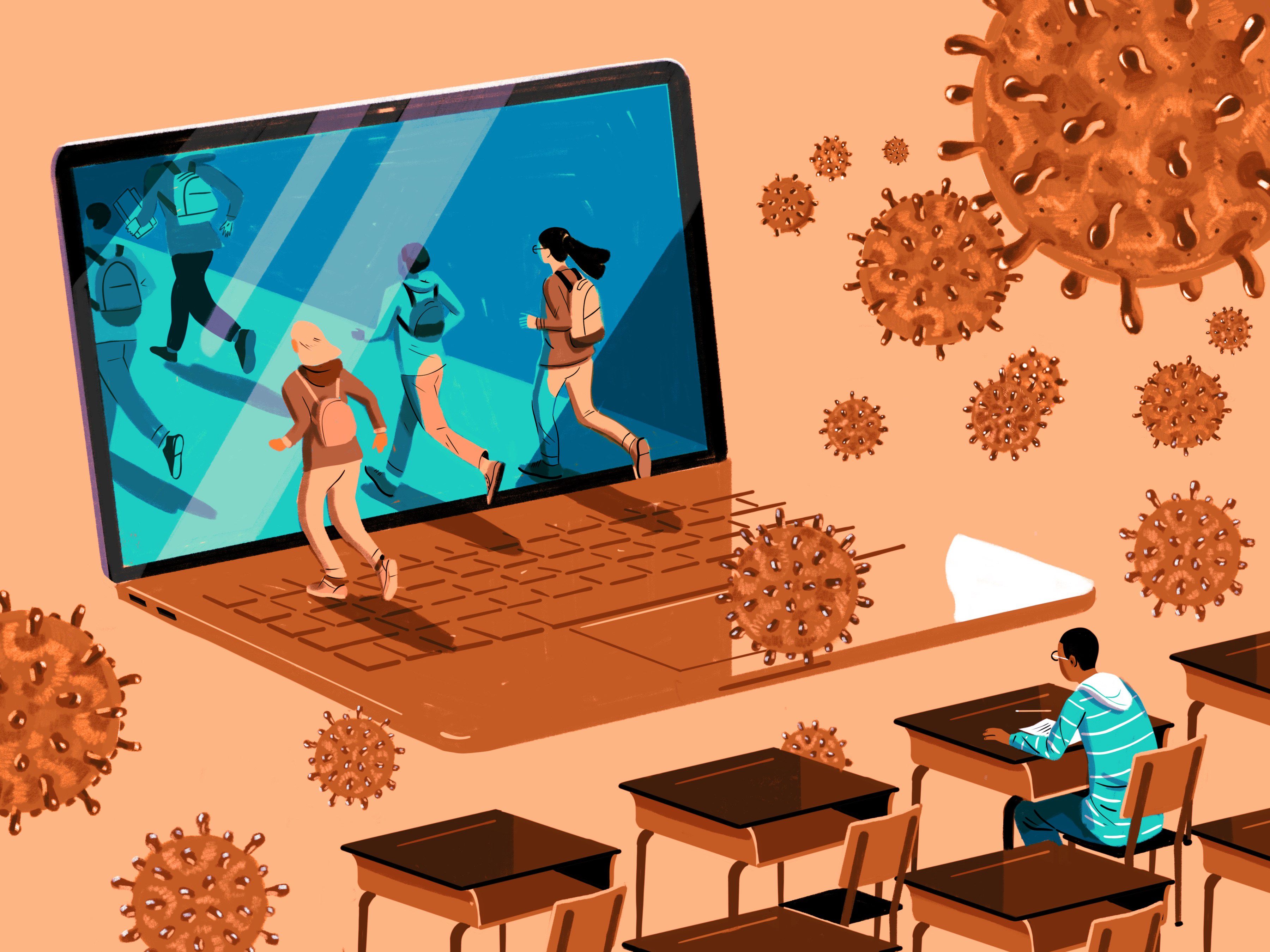Featured Artwork: Ryan Johnson
![]()
Note: I wrote this as a feature story for my Anthropology class as a final project. All those who responded to the survey have been left anonymous.
. . .
“I remember telling my mom: ‘This life is like right out of a dystopian book.’” On March 12, 2020, Montgomery County Public Schools announced that schools would be closing temporarily in response to the COVID-19 pandemic. COVID-19, or Coronavirus, spreads very easily and sustainably between people of all ages; as many doctors have said in press conferences, the virus does not discriminate. Furthermore, older people and people who have severe underlying medical conditions were seen as more likely candidates for the virus. So, when teenagers heard the news of schools closing, there were mixed reactions. Some people were glad to have a seemingly extended spring break and essentially ignored the word “pandemic”, while others immediately leaped into action as they began to plan fundraising efforts and question how they could aid those already suffering.
Now it has reached late May, and schools have since been closed for the remainder of the 2019-2020 school year as officials create different scenarios for the 2020-2021 school year. While most of the focus has gone towards high-school seniors who are missing the pivotal moments of every coming-of-age movie — prom, graduation, last day of school, senior pranks, etc. — the voices of high-school juniors have much more weight. The universal question for high-school juniors becomes scarier than the news: Do they cling on to the normal aspects of life post-March, or abandon the entire concept as the rest of the world attempts to redefine “normalcy?”
From waking up with the sun at 6:30 a.m. to sleeping in until noon at the earliest, high-school juniors have almost been slapped in the face by the sudden changes to their everyday routine. For the more extroverted students, shared sentiments are shared on social media of missing friends and the time spent walking the hallways and hugging friends after classes. For the quieter students, the loss of freedom is felt physically — since the stay-at-home orders were effectively put in place by Governor Larry Hogan at 8 p.m. on March 30, students who were used to being surrounded by hundreds of people their own age are now stuck inside with family members and/or pets, changing the entire definition of school. Not to mention, schools are still attempting to conduct classes, moving to the ever-popular Zoom for video-chatting and using online classrooms like Google and myMCPS as substitutes. Previous sentiments of technology and social media pulling people apart have now become irrelevant.
Some find comfort in the fact that apps such as Hangout or Netflix Party exist as alternative options to hanging out with friends, and social media applications such as TikTok and Instagram have become the prime spot to communicate with friends. When it comes to maintaining relationships online, Generation Z has come prepared for this pandemic; the new normal is just a severely extended weekend for the younger and more technologically advanced generation. In terms of schoolwork, the lack of discipline and structure has thrown every student for a loop that no one could have ever prepared themselves for. Between researching colleges in preparation for the Common Application opening on August 1, and trying to finish the school year to the best of their ability, the new academic life of high-school juniors is… weird, to say the least. “It’s a good time for juniors to research schools more and it definitely relieved some pressure around exams. It’s nice to have free time and learn how to schedule an empty day but I would obviously rather be in school.” To hear this sentiment of missing school has been strange for teenagers who are well-known for being anti-establishment and anti-school, but to some, going to school was more freeing than “feeling trapped in my own home.”
While knowledge is power and learning about how the world is responding to COVID-19 is extremely useful and educational, the repetitive nature of the news has been boring to some teens, but it’s also scary to live through a major historical event that feels almost apocalyptic. Most news sources report the fears of teenagers being limited to the occurrence of prom, graduation, senior pranks, the last day of school, and yearbooks — and this much is true, these fears are valid and present amongst high-school juniors. But more than that, the debate of “Human Safety v. Economy”, as well as the government’s response and the effectiveness of online learning, have taken center stage in social media discussions between teenagers across the globe. However, unlike many government officials in charge of keeping their citizens safe and alive, a majority of American teenagers agree: “If we are going to struggle economically no matter what, so we should prioritize the health of our communities. In general, I strongly believe health outlaws the economy in every situation, and the American ideals of freedom do not apply to every situation so believers of the reopening of the economy need to stop using that as a selling point for their inhumane claims.” Many online discussions also lead to a comparison to other countries’ leadership; Australia, South Korea, Taiwan, India, Denmark, Norway, Canada, and Finland have all been cited as examples of countries where “their citizens are taking advice into extreme consideration” and importance is put on “ensuring the well-being of their citizens by providing tests for every person and supplying people with groceries as needed.”
While high-school juniors have had one of the most important years of their high-school careers taken from them, they have risen to the occasion in order to help out their community in every way they can. For some it’s checking in on their friends’ mental health and making sure to communicate regularly, for others it’s making thousands of masks for first responders and essential workers. At the end of the day, it seems to be teenagers who are putting their sadness aside in order to ensure the safety and longevity of the world we humans inhabit. “I think that it’s extremely difficult to handle the situation so although I don’t think it’s a great system, there isn’t much else we could do.”


Leave a Reply